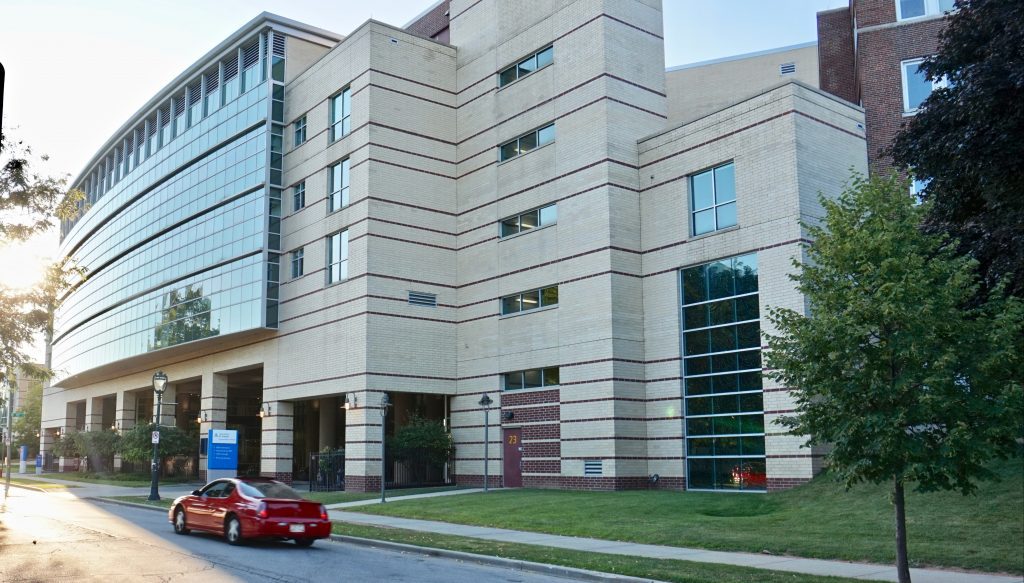Don’t Give Up on St. Joseph’s Hospital
If we want hospital to stay committed to the community, we must continue to patronize it.

Ascension St. Joseph hospital, located in Sherman Park, is an essential provider of medical services to North Side residents. Photo by Andrea Waxman/NNS.
As CEO of the Social Development Commission, also known as the SDC, the largest community action agency in the state, it’s time for me to speak out about Ascension St. Joseph Hospital again.
You may recall last year reporters wrote about medical cuts planned for the only hospital serving Milwaukee’s northwest side and beyond. Advocating for Milwaukee County residents, SDC took a hard stand. We publicly criticized the proposed cuts of surgical and inpatient services stating the plan was a contradiction to the hospital’s governing mission.
Conversations between SDC and Ascension St. Joseph Hospital (affectionately called St. Joe’s) were uncomfortable at that time. Perhaps that’s why a friend was surprised to see me – of all people – wandering the halls at St. Joe’s on a day off. I explained to him, like I’m explaining to you, St. Joe’s is my hospital. My kids were born here. On this particular day, my doctor ordered some diagnostic tests, and I was here to take them. The outstanding quality of St. Joe’s medical care has never been in question.
So why wouldn’t I be here? And shame on me if I’m not.
Don’t get me wrong. I’m not saying we take the pressure off St. Joe’s. The hospital must meet our health care needs. Customer service and clinical outcomes should be second to none. However, as patients, we have a role to play too.
We must use the hospital.
As someone with commercial insurance, I have more opportunity to pick and choose where I want to go for medical care. When I leave my community and bypass hospitals like St. Joe’s for just the aesthetics of a more luxurious hospital, I become part of the problem. Too often people think hospitals in underserved communities offer substandard care. As a former president of one of the larger hospitals in an underserved area, I can tell you nothing is further from the truth.
Think about it.
Hospitals that serve a sicker population have doctors and nurses that regularly treat a wide range of medical conditions. They see everything. And often, their patients seek treatment when a condition is in an advanced stage or there is an emergency situation. It takes good, experienced providers and support staff to address those healthcare needs. You will find them at St. Joe’s.
St. Joe’s may never have all the fancy artwork or waterfalls that other hospitals have. Personally, I don’t need them. What I need is more available staff to provide high-quality care with great customer service.
Here’s a second reason to use St. Joe’s.
Recently, my friend’s sick mother went to the hospital (not St. Joe’s). She spent three days waiting in the emergency room before a hospital inpatient bed was available. Maybe these long waits have happened to you or someone you love.
Here’s my point.
If a hospital like St. Joe’s further reduces or eliminates service, it will negatively impact the balance of healthcare coverage in Milwaukee’s under-served communities. With less resources available, there will be more patients waiting to get a bed or other services.
Here’s the third and final reason I suggest you make St. Joe’s your hospital. Ascension says it’s committed to the community. It reversed decisions to move or cut additional critical services.
That means, the next move is on me. And you, too. Especially if you have commercial insurance.
Hear me clearly.
I say let’s continue to hold St. Joe’s accountable to the community. SDC will continue to work with organizations like the St. Joseph Accountability Coalition. But just as healthcare systems are accountable to us, we must do our part by doing business with the hospital. Otherwise, our concerns and protests are in vain.
If you can choose which hospital you use, I encourage you to choose Ascension St. Joseph hospital. That’s where you’ll find me. I’m going to stay, fight and invest in St. Joe’s so it can serve our community for generations to come.
Op-Ed
-
Wisconsin Candidates Decry Money in Politics, Plan to Raise Tons of It
 Dec 15th, 2025 by Ruth Conniff
Dec 15th, 2025 by Ruth Conniff
-
Trump Left Contraceptives to Rot; Women Pay the Price
 Dec 8th, 2025 by Dr. Shefaali Sharma
Dec 8th, 2025 by Dr. Shefaali Sharma
-
Why the Common Council’s Amended Budget is Good Policy for Milwaukee
 Nov 20th, 2025 by Alds. Marina Dimitrijevic and Russell W. Stamper, II
Nov 20th, 2025 by Alds. Marina Dimitrijevic and Russell W. Stamper, II





















Here is an alternative view. It is important to distinguish among several things: health insurance/”coverage”; health care at various levels (acute, primary, specialty); “health”; and healthy communities. In this context, an acute care hospital is, to a certain extent, evidence of failure to achieve healthy communities. This is particularly true in low income communities where a small percentage of the population accounts for a large percentage of health expenditures. (For example, in Camden, New Jersey, it was discovered that 1% of the population accounts for 30% of all health care spending.) In low-income communities in particular, these issues are associated with “lifestyle” chronic illnesses, such as diabetes and poverty related conditions like depression and a range of other stress-related maladies, including self-medication in the form of substance abuse, violence and accidents.
If St. Joseph’s will cease being an acute care hospital, there is a path to an outcome that leads to a far healthier community on the north side of Milwaukee: use this great space to become the integrated platform for building that healthier community, incorporating under one roof the full range of high quality services and programs. Typically these would include robust primary care and urgent care, along with full resourced social services and community development components, and outreach that connects with a range of sometimes difficult to reach individuals and groups of all ages. The goal: to make health, healthy living and, in the end, a healthy community the outcome, as opposed to the standard “inner city” hospital that sees the failures to achieve healthy communities.
Today, this opportunity is enhanced by the availability of information technology that makes it possible to individualize services that are typically fragmented and disjointed, in the process improving lives and significantly decreasing health care costs. It is doable.
Thanks George for being a great community advocate!!